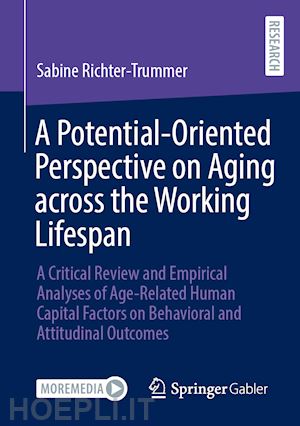

Questo prodotto usufruisce delle SPEDIZIONI GRATIS
selezionando l'opzione Corriere Veloce in fase di ordine.
Pagabile anche con Carta della cultura giovani e del merito, 18App Bonus Cultura e Carta del Docente
Considering decreasing birth rates and increasing rates of life expectancy, the workforce is rapidly aging – resulting in a more age-diverse labor market. So far, research in IWO-psychology has not fully addressed age-related constructs and issues of new work with longitudinal methods representing changes over time more adequately. To enhance predictions for a rapidly aging workforce, this research focuses on the influence of the potentials of actively aging individuals on frequently cited attitudes and behaviors over the working life span. The results suggest that a more differentiated view of age is partially effective in reducing the probability of turnover intention among IT-employees over time, the age-entrepreneurship relation can be clarified by focusing on the inconsistencies of age and the dimensions of human capital partly contribute to engaging in postretirement work. The outcomes have implications regarding the temporality of aging, entrepreneurial generational identity, calling to work and residuals about postretirement work. Qualitative follow-up research addressing the reasons for turnover intention and work activities retirees experienced as calling seems promising.
Introduction.- Aging at work over the lifespan.- Differentiation of age for clarifying turnover intention.- Transfer of the GATE lens to entrepreneurship.- Broadening the age perspective to post-retirement work.- Conclusion of the thesis.
Sabine Richter-Trummer was awarded her PhD at the Chair of Work and Organizational Psychology at the Bundeswehr University Munich. Together with Prof. Sonja Sackmann, she investigated the influence of aging on employee retention using longitudinal studies.











Il sito utilizza cookie ed altri strumenti di tracciamento che raccolgono informazioni dal dispositivo dell’utente. Oltre ai cookie tecnici ed analitici aggregati, strettamente necessari per il funzionamento di questo sito web, previo consenso dell’utente possono essere installati cookie di profilazione e marketing e cookie dei social media. Cliccando su “Accetto tutti i cookie” saranno attivate tutte le categorie di cookie. Per accettare solo deterninate categorie di cookie, cliccare invece su “Impostazioni cookie”. Chiudendo il banner o continuando a navigare saranno installati solo cookie tecnici. Per maggiori dettagli, consultare la Cookie Policy.